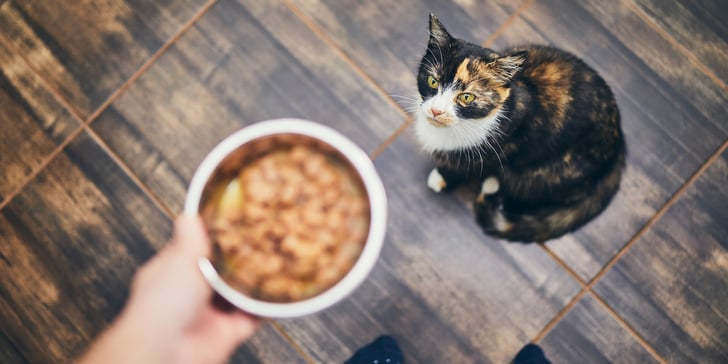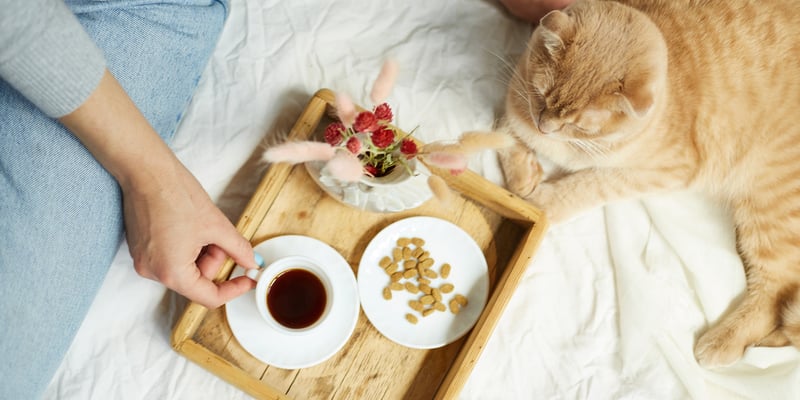What Do Cats Like to Eat for Breakfast?
Index:



Introduction
Cats are creatures of habit, and establishing a healthy breakfast routine is important for their overall wellbeing.
As a cat owner, you may be wondering what the best breakfast options are for your feline friend.
This article will explore the dietary needs of cats, recommend top breakfast foods, and provide tips for making breakfast an enjoyable experience for your cat.
Understanding your cat's dietary needs
What nutrients do cat's require in their diet?
Cats are carnivorous, which means they require a diet primarily consisting of animal-based proteins.
Unlike humans and some other animals, cats need to eat meat to survive and thrive. Their bodies are designed to digest and utilise nutrients from animal sources efficiently.
The essential nutrients cats require include:
Proteins
Fats
Vitamins and minerals
Water
It's crucial to provide a balanced diet that meets all of these nutritional requirements to keep your cat healthy.
Proper dental care is also an important aspect of maintaining your cat's overall health.
How do cats' taste buds differ from humans?
Cats have a unique sense of taste that differs significantly from humans. While humans have around 9,000 taste buds, cats only have about 500.
This means their ability to taste certain flavours is limited compared to ours.
Interestingly, cats don't have the ability to taste sweetness. Their taste buds are primarily designed to detect savoury flavours, which are abundant in meat.
This explains why cats love protein-rich foods and may show little interest in fruits or vegetables.
Why is breakfast important for your cat?
Breakfast is often considered the most important meal of the day for humans, and the same can be true for cats.
A nutritious breakfast can:
Provide energy for the day ahead
Help regulate blood sugar levels
Support a healthy metabolism
Prevent overeating later in the day
Establishing a consistent breakfast routine can also help maintain your cat's digestive system and overall health.
For more health tips, check out our guide to cat acne which is another health issue that proper diet and hygiene can help prevent.



Top breakfast foods for cats
What are the best protein sources for cats?
When it comes to breakfast, high-quality protein sources should be the main focus. Some excellent protein options for your cat's breakfast include:
Canned cat food: High-quality canned food is often an excellent choice for breakfast. It typically contains a good balance of proteins and moisture.
Cooked eggs: Eggs are packed with protein and can be a nutritious addition to your cat's diet. Always ensure they are fully cooked to avoid the risk of salmonella.
Cooked meat: Small amounts of cooked and unseasoned chicken, turkey, or fish can be a tasty breakfast option.
Commercial cat foods: Many commercial cat foods are formulated to provide a balanced diet and can be suitable for breakfast.
Food allergies in cats are important to consider when selecting the right breakfast foods for your feline friend.
Can cats eat grain in their breakfast?
While cats are primarily carnivores, small amounts of grain can be included in their diet. However, grains should not be the main component of your cat's diet.
You might see your cat eating grass in the morning and wondering why. This is believed to be a natural instinct but more info is available at the link above.
Please note that some cats may have sensitivities to grains, so it's best to consult with your veterinarian before introducing grains into your cat's breakfast routine.
Are there any fruits or vegetables safe for cats?
While fruits and vegetables shouldn't make up a significant portion of a cat's diet, some can be offered as occasional treats.
Cat-safe options include:
Small pieces of cooked pumpkin
Steamed broccoli florets
Cooked carrots
Remember, these should only be given in small amounts and should not replace the primary protein-based diet.
Can cats eat bananas? is a topic that often comes up when discussing fruit treats for felines.



How to introduce new foods to your cat's breakfast
What steps should you follow when changing your cat's diet?
Introducing new foods to your cat's breakfast should be done gradually to avoid digestive upset. Follow these steps:
Start by mixing a small amount of the new food with their current food.
Gradually increase the proportion of new food over 7-10 days.
Monitor your cat's reaction and adjust accordingly.
If your cat has diarrhoea, after they try new foods, it can be a sign that the new food isn't agreeing with them.
Our guide to the top cat foods in the UK can be a great help as we do a deep dive into several brands to help you find the best food for your cat.
How can you tell if your cat likes a new food?
Signs that your cat is enjoying a new food include:
Eagerly approaching the food bowl
Finishing the meal quickly
Purring or showing signs of contentment after eating
What signs indicate your cat might be allergic to a new food?
Watch for these symptoms that may indicate a food allergy:
Vomiting or diarrhoea
Excessive scratching or grooming
Skin irritations or rashes
Changes in behaviour or energy levels
If you notice any of these signs, discontinue the new food and consult your veterinarian. Skin conditions in cats can sometimes be related to food allergies.



Common breakfast mistakes to avoid
What are the risks of feeding cats human food for breakfast?
While it might be tempting to share your breakfast with your cat, many human foods can be harmful to cats. Foods to avoid include:
Milk and dairy products (many cats are lactose intolerant)
Foods high in sugar or salt
Onions and garlic (these are toxic to cats)
Chocolate
Raw eggs or meat
Cheese for cats is a common question, but it's generally not recommended due to lactose intolerance.
How much should you feed your cat for breakfast?
The amount of food your cat needs depends on factors like age, weight, and activity level. As a general rule, adult cats should be fed two meals a day, with breakfast being one of these meals.
Consult with your veterinarian to determine the appropriate portion sizes for your cat based on their individual needs.
Why is it important to avoid overfeeding your cat?
Overfeeding can lead to obesity, which is a significant health concern for cats. Obesity can increase the risk of various health problems, including:
Diabetes
Joint problems
Heart disease
Reduced lifespan
Maintaining a healthy cat's weight is crucial for their overall wellbeing. Feline diabetes is often linked to obesity in cats.



Tips for making breakfast fun
How can you create a breakfast routine for your cat?
Establishing a consistent breakfast routine can help your cat feel secure and content. Consider these tips:
Feed your cat at the same time each morning
Use a designated feeding area
Interact with your cat during mealtime to make it a positive experience
What fun feeding toys can enhance your cat's breakfast experience?
Feeding toys can provide mental stimulation and make breakfast more engaging for your cat. Some options include:
Puzzle feeders
Treat-dispensing balls
Interactive food mats
How can you encourage your cat to be more active during breakfast?
Incorporating activity into your cat's breakfast routine can help promote a healthy lifestyle. Try these ideas:
Hide small portions of food around the house for your cat to "hunt"
Use a feeding toy that requires your cat to work for their food
Play with your cat before or after breakfast to encourage exercise
Conclusion
It's important that you give your cat the best quality foods, but it can be a confusing issue with so many options.
Whether it's snacks, dry food like kibble, or wet food like popular canned meats, it all has an effect on their health.
By following our guide above and understanding your cat's nutritional needs, you can ensure that breakfast becomes an enjoyable and healthy part of your cat's daily routine.
Remember, every cat is unique, so it's essential to tailor their diet to their individual needs and preferences. If you have any concerns about your cat's diet or eating habits, always consult with your veterinarian for personalised advice.
Our other helpful guide such as why cats love boxes and what their sleeping positions mean, can provide some insight into their unique behaviours.
Waggel Pet Insurance
Need more help? You're in luck if you're a Waggel Pet Insurance member. Along with our excellent coverage, we offer access to a 24/7 online vet to answer all your sticky questions, especially if you need grooming assistance.
Not a member? Why not get a quote now and cover your furry friend for a range of illnesses, all while enjoying our amazing perks and rewards.
Want more like this?
Get updates from us with helpful info, advice, answers to frequently asked questions and much more.
Index:
Related posts:
Get your quote
Along with our excellent coverage, we offer access to a 24/7 online vet to answer all your sticky questions.





